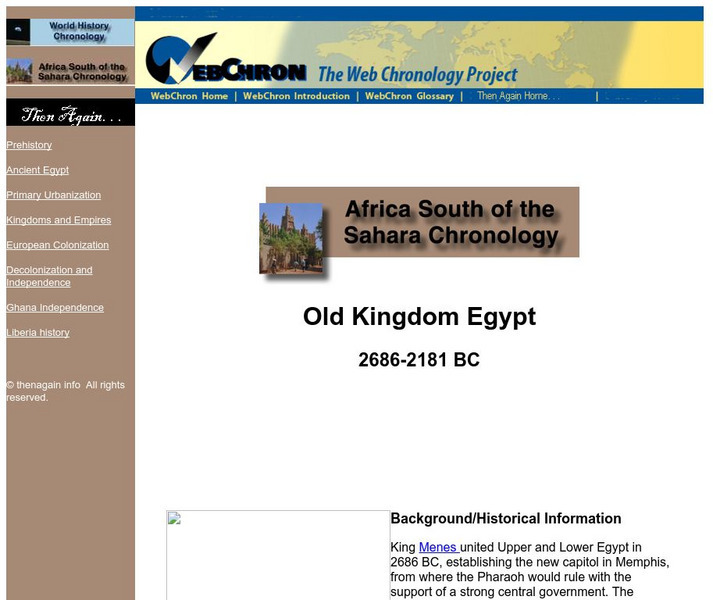Other
Travel China guide.com: Shang Dynasty
An overview of the Shang Dynasty from TravelChinaGuide.com discusses the kingdom under some of the most renowned rulers of the empire, their achievements in bronze work and crafts, their tradition of ancestral worship, and the decline of...
PBS
Nova Online Adventures: Pyramids, the Inside Story
Use this site to explore the pyramids of Egypt and to learn how they were built and why.
Other
Dr. Zahi Hawass: Quest for the Mummy of Hatshepsut
The story of Dr. Hawass's (Egypt's foremost expert on ancient Egypt) first attempts to locate and identify the mummy of Hatshepsut. He finally identified her mummy in 2007.
Other
The Achaemenians
Read about the various kings of the Persian Empire and the battles they created to strengthen their empire.
World History Encyclopedia
World History Encyclopedia: Amenhotep Iii
Reference material on the life and history of one of ancient Egypt's 18th Dynasty rulers, Amenhotep III.
TED Talks
Ted: Ted Ed: The Myth of Sisyphus
Sisyphus was both a clever ruler who made his city prosperous, and a devious tyrant who seduced his niece and killed visitors to show off his power. Alex Gendler shares the myth of Sisyphus.
Then Again
Then Again: Web Chron: Government in Ancient Egypt
This site from the North Park University provides information concerning the Old Kingdom of Egypt (2686-2181 BC) and its system of government. Examines the functions of the government and the links between government and religion.
University of Manchester
Children's University of Manchester: Ancient Egypt: Egyptian Timeline
Interactive timeline of key events in the history of ancient Egypt, with embedded references to many of Egypt's famous rulers, such as Hatshepsut, Tutankhamen, Rameses the Great, and Cleopatra.
Discovering Egypt
Discovering Egypt: Old Kingdom
This article list the rulers, dynasties, and major events of Egypt's Old Kingdom from the 1st dynasty (3100-2890 BC) to the 8th dynasty (2181-2125 BC).
Smithsonian Institution
National Museum of American History: Parthia: The Forgotten Empire
The Parthian Empire lasted for five hundred years and have been mostly forgotten, despite their prowess in the Middle East. Their kingdom began in 247 BC when Arsaces I was elected as King of Parni. They were the only civilization that...
Curated OER
Educational Technology Clearinghouse: Clip Art Etc: William the Conqueror
William the Conqueror (1066-1087), as represented on his seal. Although William really ruled 'as king by the edge of the sword,' he preferred to base his title on the promise of Edward the Confessor rather than on force of arms; and he...
Curated OER
Eternal Egypt: Nedjmet
Nedjmet was the wife of the general, King Herihor, who obtained the post of High Priest of Amun and ruler of Thebes under Ramesses the Eleventh. She had a long life and died during the reign of Smendes, founder of the Twenty-First Dynasty.
Curated OER
Eternal Egypt: Montuemhat
Montuemhat served the Nubian Kings Taharqa and Tanutamun of the Twenty-Fifth Dynasty. Montuemhat became the ruler of Upper Egypt down to El-Ashmunein, or Hermopolis. Later, in the time of Psammetik the First of the Twenty-Sixth Dynasty,...
Curated OER
Eternal Egypt: Ramesses the Fourth
Ramesses the Fourth was the son and the successor of the great king Ramesses the Third and he was considered to have been the first of a series of increasingly weak rulers.
Curated OER
Eternal Egypt: Ptolemy the Second
Ptolemy the Second ascended the throne in 285 BC and reigned with his father until 283 BC, when he became the sole ruler of Egypt. He introduced the monopoly system in various fields such as agriculture and building projects. He also...
Other
Modern World History: The Legacy of Leopold's Congo Colony
The Congo is rich in raw materials which make it a haven for unscrupulous rulers looking for wealth. From King Leopold to Mobutu, the people of the Congo have suffered under brutal dictatorships. Read the following synopsis and view...
Ducksters
Ducksters: Ancient Egyptian History for Kids: Pharaohs
Kids learn about Ancient Egyptian Pharaohs. The rulers and kings of this world civilization.
Curated OER
Educational Technology Clearinghouse: Clip Art Etc: Charles I
Charles I (1625-1649) was a far abler ruler than his father. He was a man of greater courage and more dignity of character, but he had been trained from infancy in the belief of his divine right to fule, and he chose ministers who...
Curated OER
Educational Technology Clearinghouse: Clip Art Etc: James Ii of England
James II of England and Ireland, James VII of Scotland (14 October 1633 - 16 September 1701) was King of England, King of Scots, and King of Ireland from 6 February 1685. He was the last Catholic monarch to reign over the Kingdoms of...
Curated OER
Eternal Egypt: Standing Statue of Hatshepsut
Queen Hatshepsut is portrayed wearing the Nemes headdress with a uraeus, or royal cobra, and the Shendyt kilt so that she would be accepted by the Egyptians, whose traditions demanded a male ruler. The statue was destroyed in the time of...
Curated OER
Educational Technology Clearinghouse: Clip Art Etc: Simon De Montfort
Simon de Montfort, 6th Earl of Leicester (1208 - August 4, 1265), was the principal leader of the baronial opposition to King Henry III of England. After the rebellion of 1263-1264, de Montfort became de facto ruler of England and called...
Curated OER
Educational Technology Clearinghouse: Clip Art Etc: Francis Joseph I
Francis Joseph I (1830-1916), emperor of Austria and king of Hungary, and next to the last of the Hapsburg rulers. -Foster, 1921
Curated OER
Educational Technology Clearinghouse: Clip Art Etc: William Rufus
William II (c. 1056 - 2 August 1100), the third son of William I of England (William the Conqueror), was King of England from 1087 until 1100, with powers also over Normandy, and influence in Scotland. He was less successful in extending...
Curated OER
Etc: Clip Art Etc: Edward Vi. Writing His Journal
Edward VI became King of England and Ireland on January 28, 1547, at just nine years of age. Edward, the son of Henry VIII and Jane Seymour, was the third monarch of the Tudor dynasty and England's first ruler who was Protestant at the...










